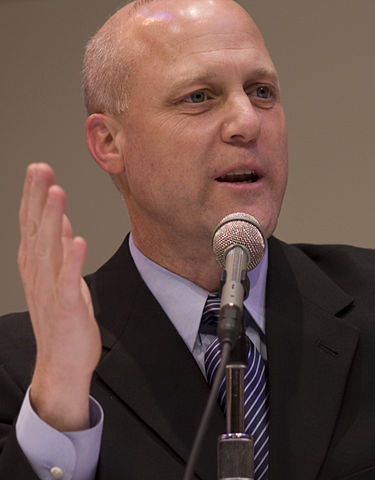Mayor Mitch Landrieu on Confederate history
Removing Confederate statues has become a pretext for white supremacist and neo-Nazi activity, most memorably in Charlottesville, Virginia, a couple of weeks ago. New Orleans mayor Mitch Landrieu addressed the situation more clearly and with more moral authority than many better-known politicians.

Mitch Landrieu, photo by Derek Bridges from New Orleans, United States CC BY 2.0
Mayor Landrieu delivered the speech last May, as his city prepared to remove its last few Confederate monuments, and the folks over at Pod Save America—President Obama’s former speechwriters and communications director—recently called it the best speech on the subject they’ve seen. So I thought you might be interested in my thoughts about what makes this speech so compelling.
Every other week, I do a deep analysis of a piece of writing for the people subscribed to my Weekly What series—a yearlong, self-directed writing program that I’ve offered in connection with my Writing Unbound course. Here are some excerpts from my analysis.
Mayor Mitch Landrieu tells a powerful story
Mayor Landrieu begins with two things I usually caution against: a thank you and a list. As for the thank you, at least it’s brief. But the list is not. And I’m okay with that. The Civil War is usually seen as a black- vs.-white thing or North vs. South. But in New Orleans, nothing is ever that simple. So I love that the Mayor began by naming all the tribes and nations whose people shaped the history of this remarkably polyglot city. Then he continued:
But there are also other truths about our city that we must confront. New Orleans was America’s largest slave market: a port where hundreds of thousands of souls were bought, sold and shipped up the Mississippi River to lives of forced labor of misery of rape, of torture. America was the place where nearly 4000 of our fellow citizens were lynched, 540 alone in Louisiana; where the courts enshrined ‘separate but equal’; where Freedom riders coming to New Orleans were beaten to a bloody pulp.
He faces the “other truths” head on. And notice the details in the description; he doesn’t let his listeners off the hook by glossing over the horrors of slavery. But he also doesn’t indict Louisiana alone—“America was the place where nearly 4000 of our fellow citizens were lynched.” I winced when I got to that last word.
So when people say to me that the monuments in question are history, well what I just described is real history as well, and it is the searing truth….
“An inaccurate recitation of our past”
Later, he demolishes the argument about historical necessity:
To literally put the Confederacy on a pedestal in our most prominent places of honor is an inaccurate recitation of our full past. It is an affront to our present, and it is a bad prescription for our future. History cannot be changed. It cannot be moved like a statue. What is done is done. The Civil War is over, and the Confederacy lost and we are better for it. Surely we are far enough removed from this dark time to acknowledge that the cause of the Confederacy was wrong.
And in the second decade of the 21st century, asking African Americans — or anyone else — to drive by property that they own; occupied by reverential statues of men who fought to destroy the country and deny that person’s humanity seems perverse and absurd. Centuries old wounds are still raw because they never healed right in the first place. Here is the essential truth. We are better together than we are apart.
And Mayor Landrieu ends by confronting the charge that removing Confederate monuments “erases history.”
We have not erased history; we are becoming part of the city’s history by righting the wrong image these monuments represent and crafting a better, more complete future for all our children and for future generations. And unlike when these Confederate monuments were first erected as symbols of white supremacy, we now have a chance to create not only new symbols, but to do it together, as one people. In our blessed land we all come to the table of democracy as equals.
If you’d like to read my full analysis, click the green button. It’s a very fine speech. Thank you, Mayor Mitch Landrieu, for your leadership on this issue.
Send me your analysis of Mayor Mitch Landrieu’s speech
Time to kick your writing skills up a level? Join me for my popular Writing Unbound program this October. A serious commitment, for people serious about change.